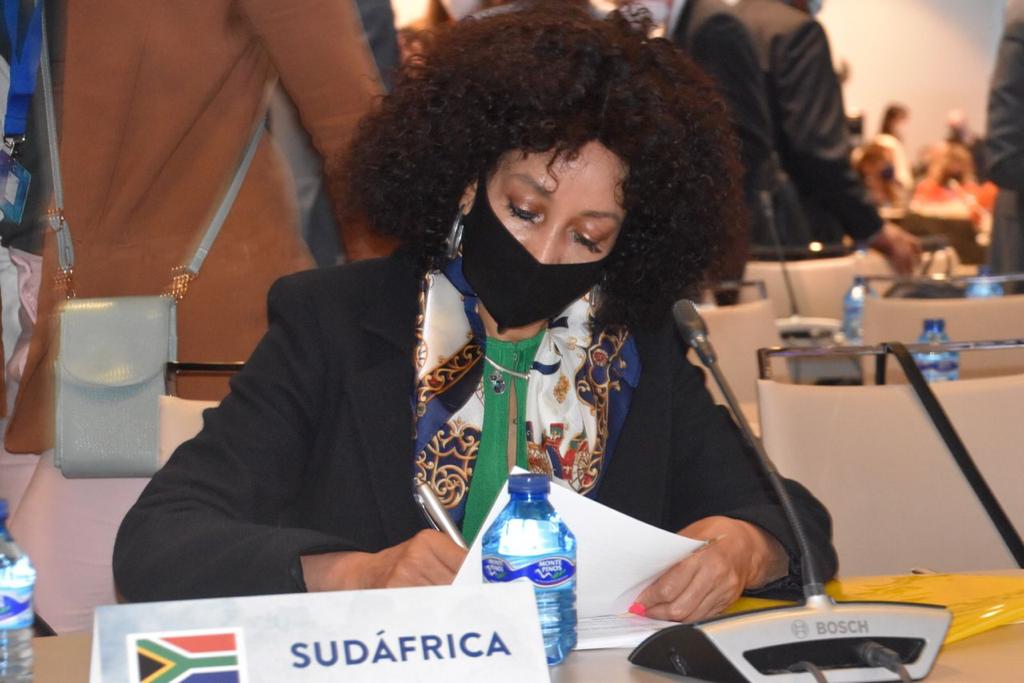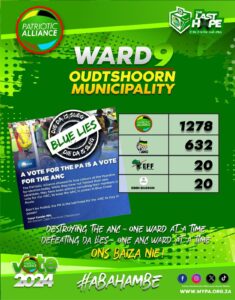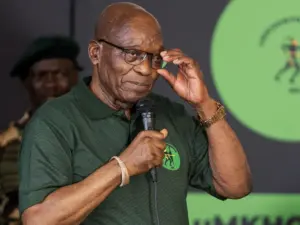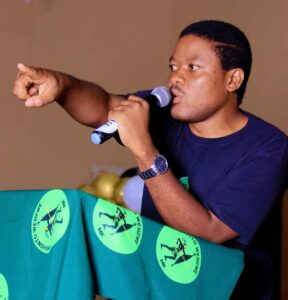It has often been said that if you think education is expensive, try ignorance. As Madiba famously postulated:
“Education is the most powerful weapon, which you can use to change the world.”
The need to properly address the educational and skills deficit of a marginalized majority of the population post-apartheid has been very costly. The bulk of unemployed youth and social grantees inevitably fall within the ill-equipped educated class.
This is a complex matter, that we in the Social Transformation Sub-Committee are grappling with, as we consider a variety of government grants at our disposal.
But what do we mean by skilling and passive acquisition of knowledge? Is it showing up in school and passing exams? It goes far beyond that.
Holistically, it encompasses the acquisition of knowledge, skills, motivation, confidence, and the development of a mindset that enables an individual and the nation to win the future. At the forefront is economic empowerment, translated into the ability to earn a living, support families, and grow generational wealth. It is not only about jobs and survival, but largely about value creation, asset building, and growth. The ability to grow businesses become essential. As someone put it- “busy-ness”.
This is how we gonna win the future. Ownership is the key component of success.
After all, if there are employees, who are the employers?.
The function of government in education is to enable and empower its citizens to succeed. The wealth of nations is a computation of the value creation and productivity of the citizenry. From this, government derives taxes to further empower its citizens. It is therefore symbiotic. However, if one-third of its citizens, as in South Africa (18 million people), rely on social grants to merely stay alive, then there is something seriously wrong with the country.
Nothing should be for its own sake, as illustrated by the anecdote of a highly educated gentleman at the pub, who over an argument, bragged “Look here, I know what I am talking about. I have a masters in biochemistry”. To which someone responded, “You have a masters in biochemistry. Can you make beer?”. The takeaway here is: the application of knowledge is essential.
This is what I refer to as the radical socio-economic transformation, not just radical economic transformation, but socio-economic.
HISTORY AND THE GLOBAL PARADIGM
No longer does a formal educational system adequately serve global needs. The game has changed to foster creativity and innovation. The game has changed to finding imaginative solutions. Experts on education and leading entrepreneurs have pointed to the significance of adaptation, problem-solving, innovation, teamwork, a little bit of craziness thrown in-positive disruption in short.
After all, with great innovation, Apple and Google disrupted the way we communicate and the way we seek knowledge. The Internet and email disrupted postal services. Social media has disrupted traditional media and communication. And recent tech companies now are far wealthier than giant oil companies, mining companies and various established industries that have been around for 100 years. We live in the digital age. We live in the fourth/ fifth industrial revolution.
What kind of education, and what kind of environment is most suited to serve the developmental needs of the country and at the same time make it globally competitive? How is South Africa going to harness its vast human and natural resources in the direction needed? It goes beyond schooling and innovation.
More than 50 years ago, the pan icon Kwame Nkrumah noted the need to equip students with an understanding of the contemporary world within the framework of African civilisations, history, institutions, and ideas. African studies as a subject was compulsory at the universities he built in Ghana.
Notably, the first recognised and continuing university in the world was African, Al Karaouine University, in Fez, Morocco (859 AD), founded by an African Woman. It was a full 229 years before the first European University was built in Italy (1088 AD). Before slavery, colonialism and oppression from the 15th Century history, tells us of the great African medieval civilisations, and the role that higher institutions of learning played in African academic and cultural life.
There is no doubt that in the 14th century, centres of learning such as Walata, Djenna, and Timbuktu had a singular impact on African and global education.
The University of Sankore, with 25,000 students had already qualified amongst the foremost intellectual centres in the world. Scholars from around the world travelled to Timbuktu to study. A popular saying was “All roads to wisdom leads to Timbuktu.” Mali became one of the largest and wealthiest empires in the world with the richest man who ever lived, Emperor Mansa Musa.
It was not only Mali. There were, amongst others. the Songhai empire, Kanem Bornu Empire, Kuba civilization of the Congo, Ghana Empire, Munhumutapa Empire of Southern Africa, Nubia, Kush, Swahili Confederation, Ancient Kemet (Egypt), and the Moors of North Africa who ruled and greatly civilized Southern Europe for 800 years (711 AD – 1492). They built 17 Universities in Spain.
The growth of empires was driven by the growth and influence of education. It then goes without saying that if your worldview and mindset is limited, distorted or constricted, so will your prospects of success in an increasingly competitive world. As the sages of ancient Kemet (Egypt) noted “Who you are is limited only by who you think you are”.
THE DECOLONISATION PROJECT
All over the continent, governments have either settled with the legacy of colonial education or tinkered with reform. But when young university students march the streets calling for the decolonisation of education, they seem to know something that our education which we as policymakers at times are blind-sided to; the poverty of the curriculum.
Let’s get this clear; South Africa is an African country. Consequently, like the illustrious African empires of old, it must strive for African excellence that is at par or superior to the rest of the world. It should begin with rebuilding the confidence undermined by colonialism. After all, confidence is half the battle won. This is where a robust, unapologetic, decolonization project becomes essential. It begins with the study of history because if you don’t know who you are, and where you have been, you will not know where you are going. It becomes limiting.
This is how Uganda tackled the decolonization issue at the level of basic education:
In colonial times African pupils and students learnt that explorers Mungo Park (Scottish) and John Speke (English) discovered River Niger and the source of the River Nile respectively, despite the fact that the people who lived around these rivers already knew of their existence and had names for them. Something was not true, was not real knowledge until it came off English lips, eyes and ears. And what came off the colonial office was meant to justify and reinforce colonialism, indoctrination, and exploitation. Thus, through education, Africans were fed an inferiority complex.” As such some amongst our leaders are casualties of this, hence they will do anything they are told to do, whether right or wrong.
This is even if it means to kill your own people. This actually goes beyond inferiority complex, it’s a chronic inability to think, dissect information organically, as well as the dangerous insatiability for the love of money, than the love and well being of your own people. This is of course a serious danger to the existence of the Movement and by extension to the downtrodden.
Also read: Hope is what we can’t surrender; writes Lindiwe Sisulu
Several steps to decolonise the education curriculum was undertaken thus:
As I was indicating in Uganda “Learners in [classes] Primary One to Three learnt about their immediate environment, through the oral strand. They learnt about the family, the home, school, neighbourhood, and sub-county. This was called the thematic curriculum, and they studied in their local languages, with English studied as a subject. It is at Primary Four that the learners transited to studying in English. Under Social Studies, learners were taught about the district in which their school is located. They learnt about its location, physical features, vegetation, people, leaders, and how to meet people’s needs in the district. In Primary Five, they looked at Uganda, Primary Six, East Africa, and in Primary Seven, Africa. There is no doubt that the curriculum was very contextual up to this level. The textbooks in use were almost all locally produced.
The textbook industry in the country boomed because materials produced from outside could not be used to teach the new curriculum. Thus, where John Speke would have been praised as the one who discovered the River Nile, the Primary Five textbook says that the river was called Kiira by the Basoga, who live around it, and John Speke was the first European to see it.
THE SPEED OF TECHNOLOGY
Developing countries in The Middle East are moving at a rapid pace to convert their finite natural resources (oil), to empower their human resources. Within their own cultural context, the Gulf countries like the UAE, Bahrain, Qatar and Saudi Arabia are making great strides in the field of education and have become globally competitive in business. For example, their airlines, shopping destinations and investments have gone global, all built on their cultural foundations, historical foundation, and language. Their schools and universities are affiliated with global best practices but have deep roots in their confidence-boosting culture and self-determination. Realising the game-changing power of technology they have invested in large innovation centres for the development and application of AI. UAE even has a minister of Artificial intelligence. Qatar is also hosting FIFA 2022, despite its petite size.
The reasons for the tectonic shift to innovation and creativity are not far-fetched. After all, while resources can yield so much that is finite, knowledge, creativity and innovative ideas are infinite. There is a need for a Pan African and National Innovation System that holistically meshes and fosters education, ideas, funding, and marketing, within a historical context. In the area of finance and the trust protocol, blockchain and its accompanying cryptocurrencies will transform the way we do business. We should be positioning.
AFRICAN-CENTERED EDUCATION
As an African country, our education must be African centred. An African-centred education is defined as education designed to empower African people. A central premise is that many Africans have been subjugated by limiting their awareness of themselves and indoctrinating them with ideas that work against them. In a 1992 article, US anthropologist Linus A. Hoskins wrote: “There is a vital necessity for African people to use the weapons of education and history to extricate themselves from this psychological dependency complex/syndrome as a necessary precondition for liberation… If African peoples (the global majority) were to become African-centred, that would spell the ineluctable end of the global powers that have dominated them. This is indeed the fear of those powers. African-centred is a state of mind, a particular subconscious mindset that is rooted in the African ancestral heritage and value system.”
Beyond this, the creativity of the South African child must be unleashed in schools to focus on creating stuff, making stuff, selling stuff, and solving problems. Cutting edge technology and its local development must be at the forefront. And if you have good stuff, you sell it to the whole world.
South African policymakers should rethink education, ensuring that it is firstly African centred, and in the best interest of the country. It is vital to our future. They must resist influences and pressures designed to entrench a status quo, that relegates Africans to the underclass in a vicious pecking order. Anything short of an overhaul of the education system will be slow suicide. Twenty-seven years after political liberation has ample illustrations of where we lost our way.
We were once a great people with great minds, nothing stops us from doing it again and it starts with education.
*Lindiwe Sisulu is a member of the ANC’s National Executive Committee(NEC). She is th chairperson of the organisation’s Social Transformation Sub-Committee. She writes in her personal capacity.







